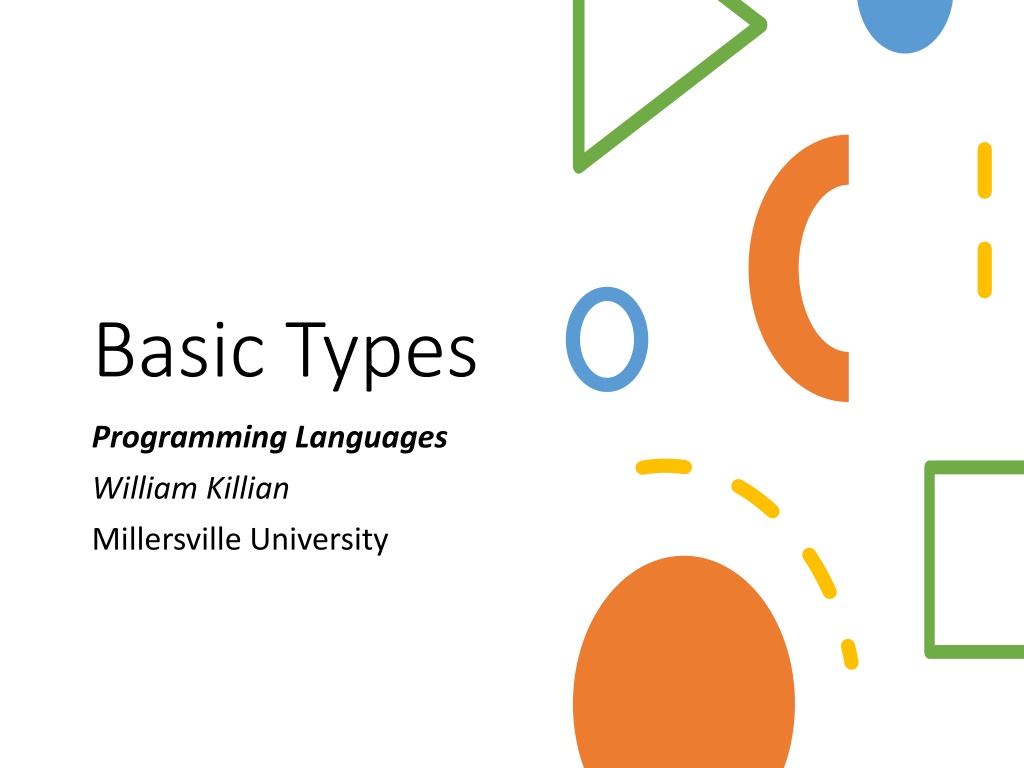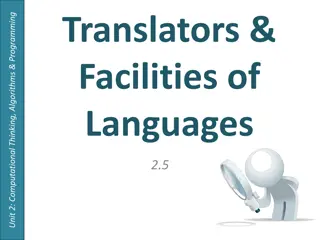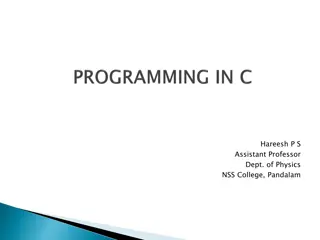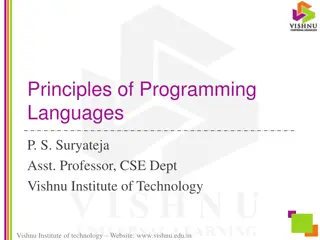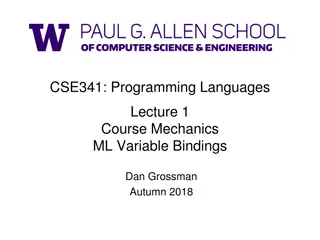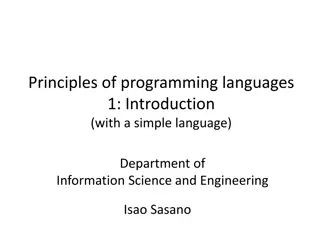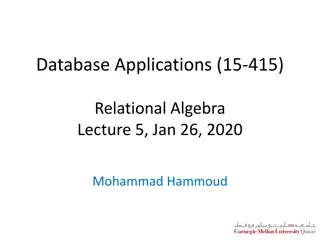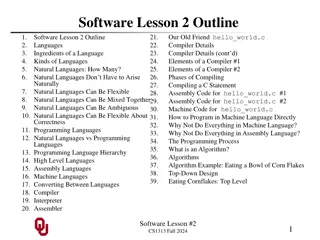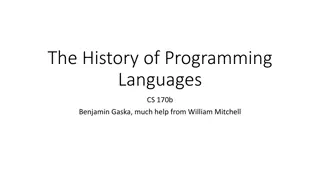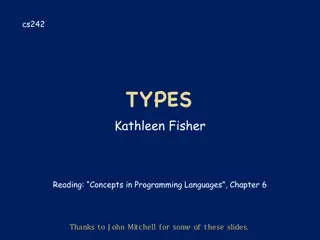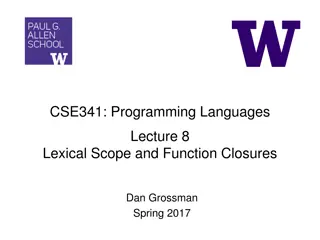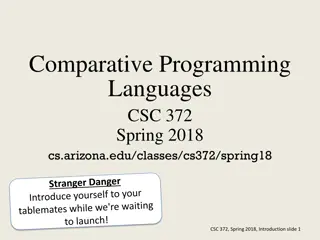Basic Types in Programming Languages Overview
In programming, understanding basic types is crucial. This overview covers primitive data types, pointers, references, enumerations, and more. Explore the fundamental building blocks like boolean, integral, and floating-point types, along with their representations and implementations in popular languages.
Download Presentation

Please find below an Image/Link to download the presentation.
The content on the website is provided AS IS for your information and personal use only. It may not be sold, licensed, or shared on other websites without obtaining consent from the author.If you encounter any issues during the download, it is possible that the publisher has removed the file from their server.
You are allowed to download the files provided on this website for personal or commercial use, subject to the condition that they are used lawfully. All files are the property of their respective owners.
The content on the website is provided AS IS for your information and personal use only. It may not be sold, licensed, or shared on other websites without obtaining consent from the author.
E N D
Presentation Transcript
Basic Types Programming Languages William Killian Millersville University
Primitive Data Types Pointers and References Sum Types Enumerations Optional Expected Variants Product Types Records Tuples Strings? Outline
Primitive Data Types
Primitive Data Types The fundamental building-blocks of programming Three main categories boolean integral floating-point What makes them primitive ? Stored directly as-is in memory Bit-for-bit stored in registers a special (super fast) memory storage location in hardware Supported operations are implemented in hardware
boolean Domain of values: true false Representation: Representing a single-bit in hardware is often impossible Instead, use a single byte (8 bits) Language-dependent: C/C++: all zeroes denotes false, anything else denotes true Java: must explicitly use true and false
integral Numerical values represented in a power-of-two notation. Possible implementations: unsigned (2n-12n-2. . . 222120) one s complement -(2n- 1) + (2n-12n-2. . . 222120) two s complement (-2n-12n-2. . . 222120) Bit : binary digit 8-bit integral numbers contain 8 individual bits which can have any permutation of values
integral Common sizes: 8-bit (char) 32-bit (int) 16-bit (short) 64-bit (long) Common language implementations int long Int/Long i32/u64 Python, C, C++, Java, OCaml, Ruby C, C++, Java Swift Rust
floating-point Numbers that have a decimal point Often some advanced hardware-based representation (e.g. IEEE 754) Various sizes (32, 64) change range and precision Common Language Implementations float Python, C, C++, Java, Ocaml, Ruby double C, C++, Java (larger) Float/Double Swift number TypeScript f32/f64 Rust
Pointers and References
Pointers and References Some Programming Languages provide a direct abstraction to a memory model Pointer points to a memory location Abstraction: memory is just a large array of bytes Interpret what is at that location as a specific type Reference refers to a pre-existing entity Usually called an alias (alternative name) Most newer languages hide pointers
Point to a location in memory (or null) Accessing null or an invalid memory location: BIG PROBLEM Languages with Pointers: C/C++ BASIC FORTRAN COBOL Go OCaml Languages with Hidden Pointers: Java Ruby Pointers
Refer to an existing entity Solves the deference pointer issue with null Languages with References: C++ Swift Rust References
Pointer types get * added Reference types get & added Case Study: C++ To Reference from Pointer: auto& ref = *ptr; To Pointer from Reference: auto* ptr = &ref;
int a = 4; int& b = a; b++; // value of a ? Case Study: C++ int* p = &a; int* q = p; a = 7; // value of p ? // value of *p ?
Sum Types When we think of sum we think of addition All types have a possible range of values boolean { true, false } uint{ 0, 1, 2, , 4294967294, 4294967295 } Sum types add the possible range of values together to the range of the new type Sum Types allow us to: Combine pre-existing types and allow one to be selected at any given time Create new datatypes for tagging information
Enumerations Optional Expected Variant Basic Sum Types When you hear sum think or
Enumerations Give us a way to specify non-integral values Often used to define a new class of information Examples: Months: January, February, March, April, Card Suits: Clubs, Diamonds, Hearts, Spades What else? // C enum suit { CLUBS, DIAMONDS, HEARTS, SPADES };
Optional When we want a choice of Something or Nothing Two classes: Something of some type we care about Nothing (None) // C++ std::optional<int> v; // initially nothing v = 4; (* Ocaml *) let x : intoption = Some 4 let y : intoption = None
Expected Gives us a way to specify a return value or an error if something else happened Two Classes: Result of some type we care about Error of some error result we can inspect Similar in structure to Optional // some made up language Expected<String, Error> data = load_file("big.txt") if (data) { // valid ... } else { // inspect error ... }
Variant When we want a choice with some possible set of values for each choice Optional and Expected are specific types of Variants Data can be tagged and can take on different forms (* OCaml *) type expr = Add of expr * expr | Mul of expr * expr | Var ofstring | Num ofint (* represents expr: x * (a + 4) *) let e = Mul(Var("x"),Add(Var("a"),Int(4)))
Product Types
Product Types When we see product we think multiplication Product types multiply the range of possible values Using Product Types allows us to: Aggregate (group) pieces of information together Create a new entity with named attributes
Records Tuples Basic Product Types When you hear product think and
Records A group or collection of named entities Referred to as classes or structs in most languages Access data via name // C++ struct Student { // A student has std::string name; // a name AND int id; // an ID number AND double gpa; // a GPA }; Student s = {"Will", 327291, 3.38 }; s.gpa = 4.0; // fix student record
Tuples A group or collection of entities Access data via location(first, second, third, ) (* OCaml *) let threeInts : int * int * int = (1, 2, 3) let (first, _, _) = threeInts; (* get first *) // C++ std::tuple<int, int, int> threeInts {1, 2, 3}; int first = std::get<0>(threeInts); # Python threeInts = (1, 2, 3) first = threeInts[0]
Strings A sequence of characters When combined can provide additional context and information Questions Should we view strings as being a basic types? Should we view strings as being a complex* type? Or could it be both? "Hello, World!" "bob" "racecar"
Primitive vs. Library Defined In some languages, Strings are primitive types OCaml JavaScript Ruby Python In other languages, they are not (library-defined) C++ Swift Rust Java In other languages, they don t exist** C
Immutability Mutable means can be changed Immutable means cannot be changed Languages where strings are mutable: Python JavaScript Rust (String) Languages where strings are immutable: OCaml Java Rust (str)
Conclusion Primitives Values that can be directly implemented in hardware (memory) Pointer and References Refer to existing instances of a particular type in memory Concept of a null memory address (pointer) Sum Types Give us a choice between options (or) Product Types Group types together (and); individually accessible Strings? Can be primitive or not; can be mutable or not
